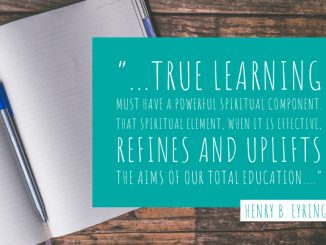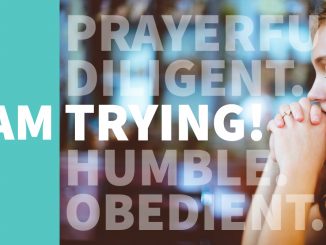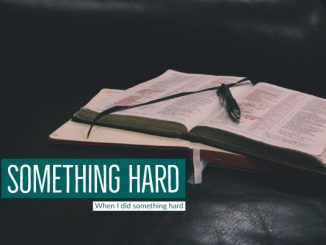
One of the assignments that we have to do in every single Religion course that we have taken in Pathway Worldwide is one that I tend to dislike doing. It is not that it is a particularly hard assignment, it just forces us all to step outside of our comfort zones–a lot. There are several different ways that we may complete the assignment, but all options involve “teaching” about the topic we studied during the week.
Confession Time
I have to confess that sometimes I fudge a little and I let the holy spirit guide me when I am interacting with people. I try to keep it on the topic of study for the week, but I am not above going over anything we have studied during the semester if that is what I feel impressed or inspired to discuss with people. That is not the case this week. I am going to share a little bit about what I learned this week.
For reference, I am currently in my 3rd semester of Pathway. I have enjoyed my overall experience, but have to confess that it was not all cupcakes and rainbows. Remember that there is intended to be “opposition in all things” per the plan laid out by our Father in Heaven. I have to trust that there is something to be learned in the struggles that I am having. I will talk about those another time. I am currently enrolled in FDREL 250–Jesus Christ and the Everlasting Gospel. It is more intense than the Book of Mormon classes that I took the previous semesters.
Why am I teaching here?
First, let me remind everyone that this is my blog and as humble or not so humble as it may be, it is about my life–in all its bits and pieces. This includes my current educational path. As a result of this, all of you, as my readers, get to endure the occasional post about religion. That is just the way it is. I am a religious individual and the gospel of Jesus Christ is a part of my life; it helps mold me into who I am.
This is not intended to preach or judge anyone, it is merely a reflection of things that I am learning and pondering. Take it for what it is worth.
Healthy conversation and discussion are welcome, but if it gets nasty and you’re the cause of it, you will be dismissed for the premises of my blog. You will be asked nicely to leave. If you continue, you’ll be blocked
Lesson Topic: Moses & Israel
This week the topic of study was Moses and Israel. This is fairly broad, but it was a wonderful week for me studying religion. I have been struggling with finding the motivation this semester, but this week I was moved to really dig in deep. I found it absolutely fascinating. I gained further depth in my understanding of Moses, the children of Israel, the Law of Moses, the tabernacle, covenants, ordinances, the priesthood, and everlasting gospel. That is just to name a little bit of what we studied.
Since I dug deeper this week, I read even more. Some of the resources were actually intended to help me write my Critical Thinking Essay for my English course, but the topics really meshed well this week. It was what I needed to hear, read, and study in both classes this week. For this I am grateful.
Our study and assigned reading consisted of the following resources (all links to an external site):
- Exodus 3–4
- Exodus 19–20
- Doctrine & Covenants 84:17–26
- Catherine Thomas, “Provocation in The Wilderness and the Rejection of Grace.”
- Bible Dictionary, “Law of Moses,” pages 722–723
- Bible Dictionary, “Tabernacle,” pages 778–780
- Edward J. Brandt, “The Law of Moses and the Law of Christ.”
My Discovery
I asked a regular Sunday churchgoer what she knew about the Law of Moses. I am not aware of her exact religious denomination. I do not think that it matters. She is a Christian. Her response:
“Nothing.”
Adult Female Sunday Churchgoer
I am not sure why I was surprised by her response, but I was. This led me to want to know more about what other people knew or believed. Here are my findings:
“The sacrifice of the best of the best of the first of the flock. The Ten Commandments and the sacrifice of the savior.”
Adult Male Sunday Churchgoer
“The great sacrifice that leads to the ultimate sacrifice.”
Adult Female Sunday Churchgoer
“It was
Young-Adult Male Sunday Churchgoervery strict set of rules that the Jews followed in the desert because the Jews could not keep their act together. It followed on after they settled because they didn’t know any other way until Christ came.”
“The commandments and laws found in the first 5 books of the
Adult Malebible , because the ten commandments were too simple.”
“I don’t know anything about the Law of Moses.”
Adult Female
“The standards and rituals that were given to Israel to teach them obedience to the Lord post-exodus from Israel. Heavily symbolic and very precise and taught to Israel by Moses.”
Adult Male Sunday Churchgoer
“Like as in the Ten Commandments? If not then ?♀️”
Adult Female
“10 commandments.”
Adult Female Sunday Churchgoer
“I think Jesus fulfilled the Law of Moses which had sacrifices and rituals, in addition to the commandments, that pointed the covenant people towards the coming Messiah.
Jesus didn’t replace it but fulfilled the sacrificial part but many of the fundamentals are still in place, like the Ten Commandments.
That’s off the top of my head.”
Adult Female Sunday Churchgoer
My Perspective
The article by Edward J. Brandt, “The Law of Moses and the Law of Christ,” emphasizes the common misconception that many people, churchgoers or otherwise, have about the Law of Moses. I love this quote from the article:
“To accurately describe the law of Moses, we would have to say that it contained the basic part of the gospel of Jesus Christ. It was never intended to be something apart, separated, or even lower than the gospel of Christ. It was simply to help the people in their focus and understanding.”
Edward J. Brandt, “The Law of Moses and the Law of Christ”
Additional Readings
As I said earlier, I read a lot of other resources outside of the assigned reading. While not all are directly related to the topic, Moses & Israel, I thought it was pertinent to share as it might help you understand where my personal head was at. Also, I just like sharing.
My reading list this past week included:
- Thomas G. Plummer, “Diagnosing and Treating the Ophelia Syndrome” (link to PDF version only)
- Hugh B. Brown, “An Eternal Quest–Freedom of the Mind” (link to Audio version only)
- President Dieter F. Uchtdorf, Second Counselor in the First Presidency, “Are You Sleeping through the Restoration?” (link to text and audio versions)
- Adam Kotter, “When Doubts and Questions Arise” (link to text version)
- Elder Carlos A. Godoy, of the Seventy, “Testimony as a Process” (link to text and audio versions)
- Elder L. Tom Perry, of the Quorum of the Twelve Apostles, “Raising the Bar” (link to text and audio versions)
- Rosemary M. Wixom, Primary General President, “Returning to Faith” (link to text and audio versions)
- Elder James B. Martino, of the Seventy, “Turn to Him and Answers Will Come” (link to text and audio versions)
- President James E. Faust, Second Counselor in the First Presidency, “Lord, I Believe; Help Thou Mine Unbelief” (link to text version only)
- Elder Neil L. Andersen, of the Presidency of the Seventy, “You Know Enough” (link to text and audio versions)
- Elder W. Craig Zwick, of the Seventy, “What Are You Thinking?” (link to text and audio versions)
- Topical Guide, “Israel, Scattering of”
- Topical Guide, “Israel, Gathering of”
A very helpful tool
I thought that I had learned to search through church resources fairly efficiently, but I discovered the Scripture Citation Index a couple of weeks ago. It is probably one of my new favorite tools to research religious topics.
In Conclusion
I do not enjoy completing these assignments. They are entirely out of my comfort zone, however, there are so many ways that we can complete them. There is no one way to teach or share the gospel with our friends or neighbors. What is important is that we do teach and share whether it be through example, friendly conversation, or simply living the gospel openly and with passion. We do not have to over-zealous in our attempts. We can be respectful and learn about other beliefs at the same time. Through this process, I have learned that it is okay to be open about my own beliefs and to treat others like I would want to be treated. I don’t want to be judged harshly for the things that I do not fully understand. Exposure raises awareness and this helps increase familiarity and comfort.




Be the first to comment